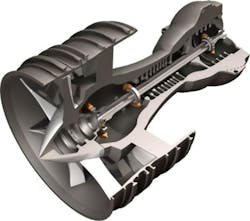Companies to harvest heat from jet engines to generate power for in-engine predictive maintenance system
The Nextreme energy harvesting system is based on the company's Thermobility wireless power generation technology, and will be part of the Arkansas Power high-temperature wireless sensors. The turbine health management system will enable jet engine maintenance experts detect, diagnose, and take action on problems in engine bearing assemblies.
Nextreme, a company founded on electronics thermal management technology, has found a way to convert waste heat -- such as that generated from computer microprocessors and turbine jet engine bearings -- into usable electrical power for a variety of applications.
Nextreme uses bismuth telluride integrated circuit material to create energy-from-heat technology that can generate about 20 to 30 milliwatts of power from heat of normally operating turbine engine bearings, which is more than enough to power the Arkansas Power embedded sensors, says Dave Koester, vice president of engineering at Nextreme.
To maintain the proper temperature differential that enables the Nextreme energy-harvesting technology to function properly, Nextreme will take advantage of oil spray cooling in the jet engine, which is in place as part of the engine's normal operation.
Arkansas Power is developing its predictive maintenance system with research funding from the F-35 Joint Strike Fighter program, and eventually could see deployment in the F-35 and other advanced U.S. aircraft if the system tests out in a satisfactory way, officials say.
The predictive maintenance system, which relies on Arkansas Power sensors and Nextreme power electronics, provides real-time monitoring of temperature, vibration, strain, and pressure to provide crucial information on the health of bearings for aircraft turbine engines and power-generation systems, says Karl von Gunten, director of marketing at Nextreme.
Using data from these systems, engine maintenance need be performed when necessary, instead of at regularly scheduled intervals, which could save time and money. Pinpointing faults in aircraft turbine bearings before they happen can alert the pilot of a problem, and inform the maintenance crew members where the actual fault is happening.
Nextreme's Thermobility power generation technology uses heat as a power source, and eliminates the need wiring or replaceable batteries. "The turbine health sensor system will allow for a more cost effective maintenance schedule and extended lifetime of turbine systems, provide early detection and diagnosis of turbine component faults, and potentially help to prevent catastrophic failures," says Ty McNutt, director of business development at Arkansas Power.
"The addition of Nextreme's thermoelectric energy harvester will reduce the total cost of ownership by eliminating the cost of battery replacement for the sensor system, as well as aiding in the integration and retrofitting of existing turbine engines," McNutt says."
For more information contact Nextreme Thermal Solutions online at www.apei.net.
